
Avonworth School District forces teachers to participate in “equity” and “social justice” training; uses outside consultant with focus on ‘gender and sexual identity’; creates social justice club
Incidents
The Avonworth School District promotes “Diversity, Equity, and Inclusion” on its website. The school district explains that a “Diversity, Equity, & Inclusion Committee” was established in the 2016-2017 school year and that “the committee has provided valuable input and has helped generate many actions taken by the District to address Diversity, Equity, & Inclusion.” The school district also explains that the curriculum taught to students has been changed to implement equity. The district states:
Having a curriculum that represents a diverse world and multiple perspectives is imperative for children to learn, grow, and become productive members of society. The Avonworth School District evaluates curriculum for cultural responsiveness through the curriculum review and evaluation process. Teachers implement projects to build awareness of bias, discrimination, and the value of inclusiveness. The English Language Arts curriculum offers a diverse list of authors and perspectives of themes and cultures.
The district explains that it is also beneficial for “white students” to build “meaningful school relationships with adults of color.” In order to achieve this goal, the district is “attracting and retaining a diverse staff.” The school district has additionally implemented training on “unconscious bias in its induction program for all new teachers.” The district has worked with the consulting firm “Herring Seminars” to implement training for teachers to ensure a “more equitable and inclusive environment.”
Herring Seminars states on its website that “your organization or school community is invited to partner with Herring Seminars to develop ways of understanding complex relations between self and systems with regard to race, class, gender, sexual orientation, physical ability/disability, and other lived cultural experiences.” A focus of this organization’s training is “gender and sexual identity.” The organization states:
During this session, participants will be educated on LGBTQUIA (Lesbian, Gay, Bisexual, Transgender, Queer/Questioning, Intersex, Asexual) related issues that often arise in school communities in order to better equip themselves to support students and colleagues who may be bullied, harassed or feel isolated.
Another topic of training is labeled “systems of privilege and oppression.” The organization explains that “this session will provide participants with the opportunity to develop skills that will allow them to help their students and colleagues navigate within the frameworks of the current systems that privilege some while oppressing others in order to create a school community that promotes equity and inclusion for all.” Another topic of training is labeled “race and ethnicity.” Herring Seminars explains that in this training “participants will take a deeper dive into the systems of privilege and oppression that created the social construct of race.”
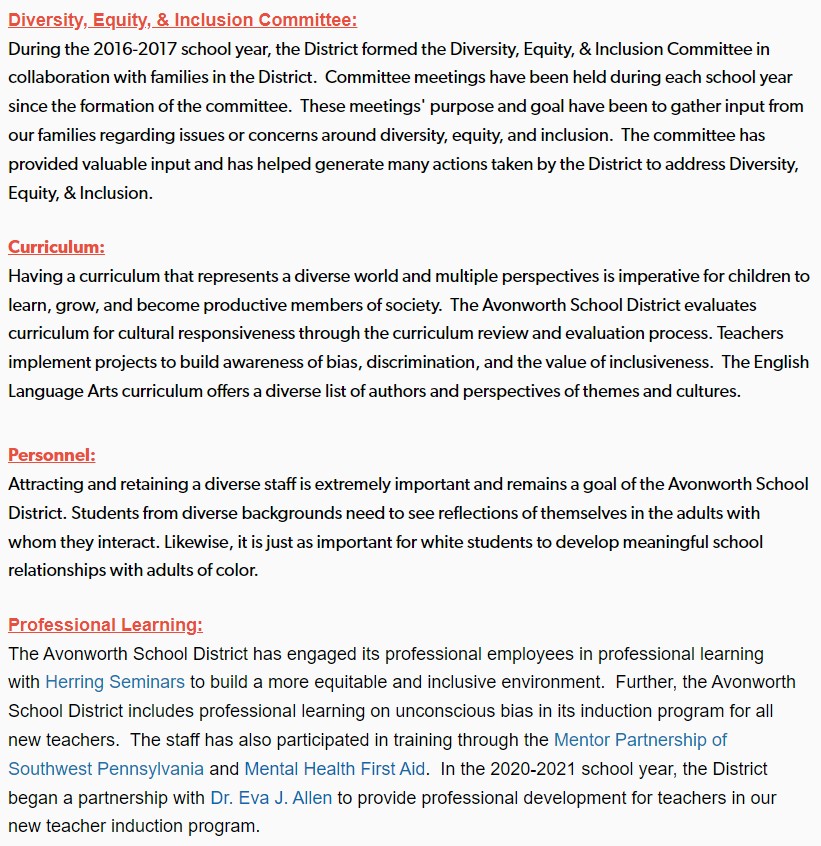
The school district’s website also has a page dedicated to the “Diversity, Equity, and Inclusion Committee.” The page features a document titled “DEI Mission, Purpose, Beliefs.” This document states that the committee “is committed to supporting anti-racist and inclusive actions that ensure Avonworth School District is a place where all students feel a sense of belonging.” The document further explains that the purpose of the committee “is to assist and support the District’s efforts in creating and sustaining an intentional anti-racist and anti-discriminatory school community that provides a welcoming and enriching environment for all.” The document then provides the following “belief statements” that specifically mention “gender identity”:
- Diversity, concerning race, gender, gender identity, sexual orientation, expressions, socioeconomic status, age, religion, and disabilities, is our strength.
- A sense of belonging is achieved when all stakeholders understand diverse perspectives, develop cultural competence, and respect the diversity of the human experience.
- Our students and overall school community achieve success when all stakeholders model inclusive, equitable, and culturally competent behaviors.
- Our students and overall school community achieve success when all stakeholders are willing to understand, appreciate, and respect diverse perspectives.
- Our students and overall school community achieve success when all stakeholders engage in productive discourse around diversity, equity, and inclusion.
- Our students and overall school community achieve success when all stakeholders are equipped to stop racist and discriminatory actions.
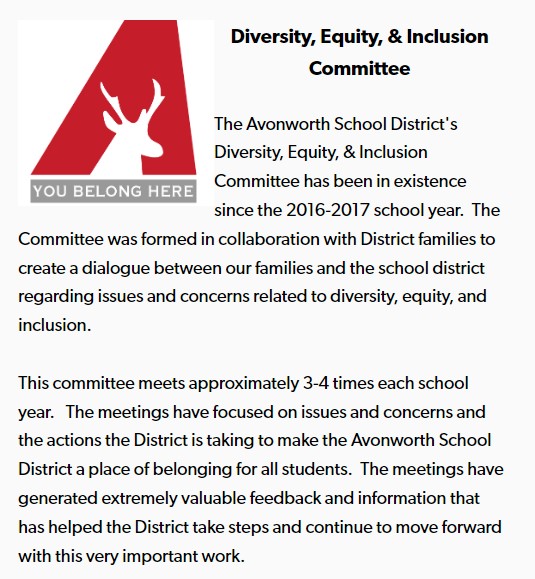
The school district’s website additionally has a page titled “Curriculum and Programming.” The school district outright states on this page that it is changing the curriculum taught to students in an effort to implement “inclusiveness” and “diversity.” The school district explains: “The Avonworth School District believes that the best way to develop empathy, an appreciation for diverse perspectives, and the ability to value others, inclusiveness, and the diversity that exists in our world is to have students engage in curricula that provide opportunities for this learning to occur.”
The school district also states on this page that an emphasis is placed on ensuring that the curriculum is “culturally responsive.” The term “culturally responsive” is often used to describe a method of teaching that includes the race and ethnicity of students as part of the lessons taught in classrooms. The district explains that it uses a “Culturally Responsive Curriculum Scorecard” to have “continuous improvement” in implementing the tenets of equity. The school district states:
We are committed to a continuous review of our curricula for its cultural responsiveness and to make changes, improvements, and updates as needs are identified. To ensure we have a continuous improvement approach for expanding these opportunities throughout our K-12 curricula, a tool for conducting a culturally responsive review of our curriculum and courses has been integrated into our curriculum review and evaluation process. The tool used has been developed by using the Culturally Responsive Curriculum Scorecard created by the Education Justice Research & Organizing Collaborative at the NYU Metropolitan Center for Research on Equity and the Transformation of Schools.
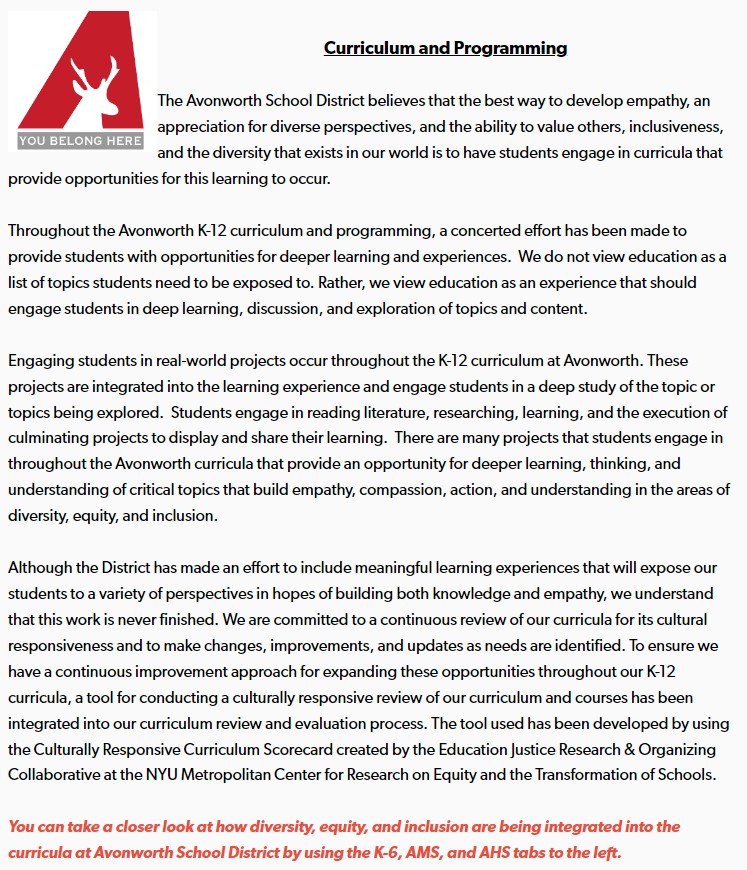
The school district’s website has pages explaining how it has implemented equity into each level of the school system. In kindergarten through the sixth grade, the school district states that “students engage in many rich and meaningful experiences to help build an appreciation of diversity, equity, and inclusion.” The district continues to state that “as we move forward with our review of our K-6 curricula, we continue to look for opportunities to expand our curriculum to be more culturally responsive.”
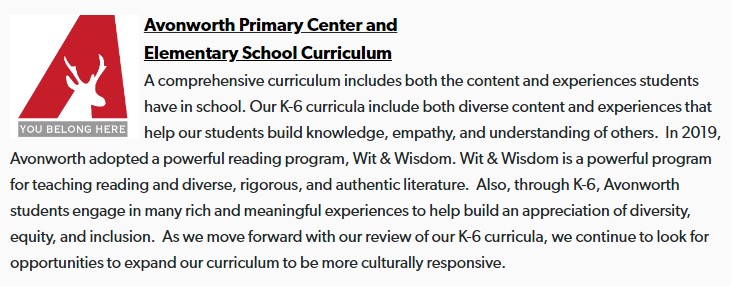
On the curriculum page for Avonworth Middle School, the school district promotes teaching students skills in “advocacy.” The district states: “Students take on challenging content while they also build skills in collaboration, communication, and advocacy.” The school district explains when discussing eighth graders: “Monica Ruiz, the Executive Director of Casa San Jose, shared her experience and work with undocumented immigrants living and working in Western Pennsylvania.” Students in the “English Language Arts/Civics” course have also been taught about perceived “racial inequality.”

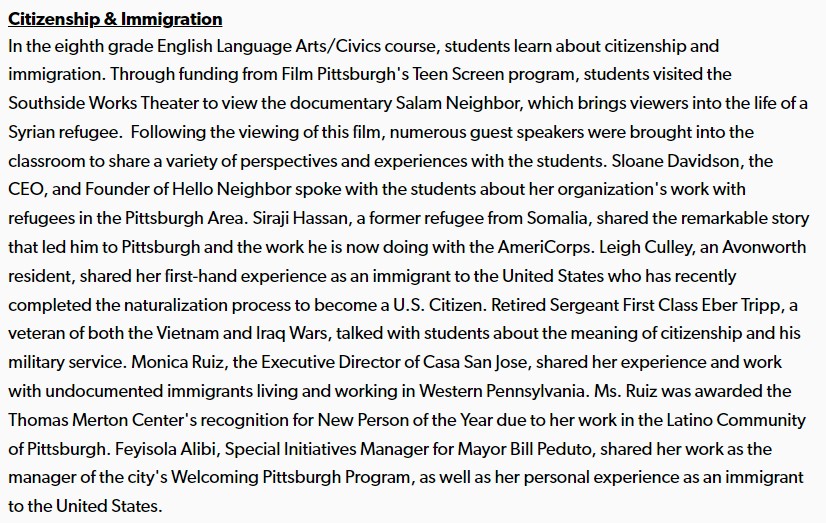

On the curriculum page for Avonworth High School, the school district states that “an effort has been made over the last five years to add courses to the high school options that are designed to provide an opportunity for students to take a deep dive into current and historical issues.” One course appears to focus on “Race, Class, & Gender.” The school district states: “Race, Class, & Gender is an introduction to the study of society through the critical analysis of social relations, behaviors, and organization. Students develop a broad knowledge of how social structures and human behavior influence each other, as well as the issues that arise from such interactions.”
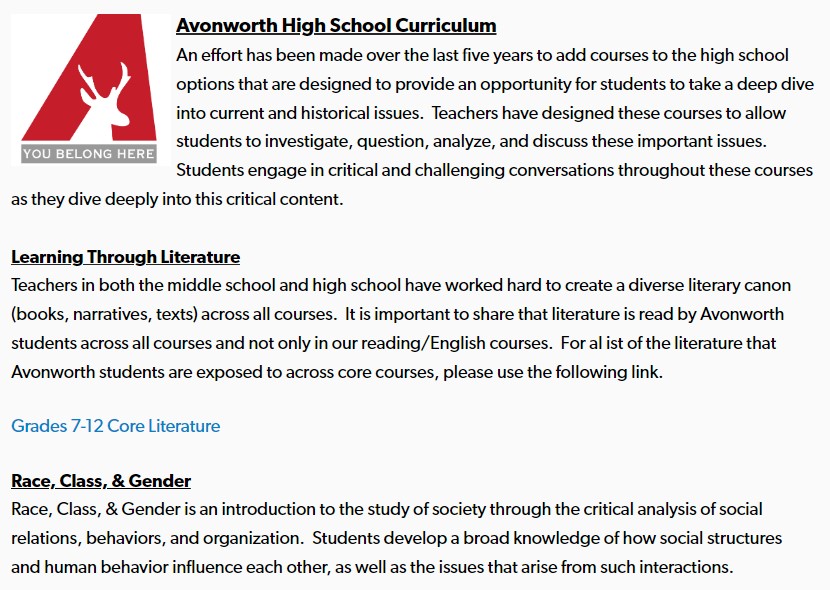
The school district’s website has a chart on a page labeled “Personnel & Professional Learning” that separates students and teachers into percentages based on race. Categories include “Asian,” “Black,” “Hispanic,” “Multiracial,” and “White.” The student breakdown is 90.2 percent white, 3.5 percent multiracial, 1.6 percent Hispanic, 2.2 percent black, and 2.5 percent Asian. The district also promotes training staff on “implicit bias” with the consulting firm Herring Seminars. The school district explains:
All new teachers in the Avonworth School District participate in a two-year New Teacher Induction Program. One of the goals that resulted from the strategic planning process was to add a component to the New Teacher Induction Program focused on implicit bias. The District is currently in the process of putting this training in place for all new teachers. This training will become a permanent aspect of the District’s New Teacher Induction Program.
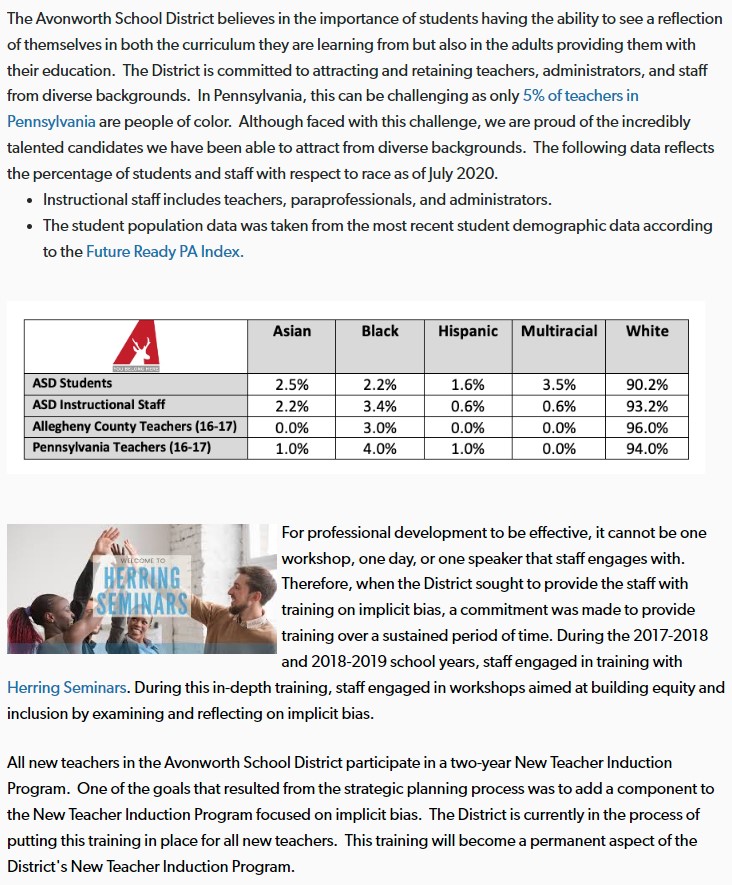
On July 13, 2020, the school district’s Board of Directors adopted a resolution titled “Supporting an Anti-Racist School Climate.” The resolution states that “we acknowledge that we must look at our own school policies and practices through an anti-racist and equity lens to address any traces of racism and inequity that still exist within our own school community.” The resolution further states that “we must better educate ourselves and seek to educate the community on the historical and current impact of racism and discrimination on our students, families, and communities, as well as understand our role in perpetuating such inequity.” The resolution explains:
We must advocate to advance civil rights and cultivate an anti-racist school climate necessary to meet the needs of ALL students in our care. Our students, no matter their race, ethnicity, religion, gender, gender identity, sexual orientation, socioeconomic status, language ability, disability, and other identities, deserve to feel safe, to feel seen, and to feel affirmed.
In the resolution, the School Board claims to “commit to use our role as school board directors to recognize, respond, and speak out against injustice and racial inequity.” This includes adding “anti-racism” material to the curriculum, implementing “social justice” teacher training, creating and supporting a “Social Justice Club,” conducting an “equity audit,” and adopting the “No Place for Hate” program. The resolution lists the following “action steps”:
- Review District policies and procedures for alignment to best practices when responding to offenses regarding racism and discrimination.
- Develop and communicate a strong, consistent message regarding anti-racism and inclusivity.
- Institute a curriculum cycle that includes a tool to review curricula for cultural responsiveness and anti-racism.
- Review and revise K-12 literary canon for cultural responsiveness.
- Representation
- Multiple perspectives
- Anti-racism
- Explore restorative justice practices for student discipline.
- Facilitate professional learning for cultural sensitivity/social justice/equity in teaching.
- Conduct parent workshops for multiple topics related to diversity/equity/inclusion/racism.
- Implement new teacher induction session focused on unconscious bias.
- Conduct a multi-cultural festival.
- Create and support a Social Justice Club.
- Explore partnerships with diverse schools.
- Continue to attract and retain a diverse staff.
- Conduct an equity audit and act on recommendations.
- Conduct annual stakeholder surveys for feedback on cultural sensitivity/social justice/equity.
- Implement No Place for Hate program at Middle/High School.
The Anti-Defamation League (ADL) has pushed its “No Place for Hate” program in America’s schools. The ADL is a known political organization that supports and advocates for left-wing causes. In a document for the “No Place for Hate” project, the ADL states that “although learning how to demonstrate kindness is an important part of a child’s psychological and social development, ADL highly encourages schools to move beyond kindness to social justice.” One section of the document is titled “Let’s Get It Right: Using Correct Pronouns and Names.” In this section, the document encourages teachers to use the preferred pronouns of students:
From an early age, many were taught that pronouns should follow specific rules along the gender binary: ‘she, her and hers’ for girls and women and ‘he, him and his’ for boys and men. However, as our society has progressed in understanding gender identity, our language must also be updated. It should be accurate and convey understanding and respect for all people, especially for those who are transgender, gender non-conforming and non-binary.
The ADL’s document then encourages teachers to implement “LGBTQ” topics into classroom discussions:
Using the lesson below, lead a discussion about the ways in which LGBTQ people, events and issues have been less visible or made invisible in mainstream accounts of history. Explore the impact of invisibility on people and how different groups have been historically marginalized in society. Then, engage students in a discussion about people who may feel invisible in their school. Be sure to focus on general identity characteristics (e.g., sexual orientation, immigration status, gender identity, etc.) rather than specific individuals. Based on this discussion, ask students to sign up to be interviewed if they feel like an aspect of their identity needs more visibility.
The “No Place for Hate” document also features a “Pyramid of Hate.” The ADL uses the document to explain that “while every biased attitude or act does not lead to genocide, each genocide has been built on the acceptance of attitudes and actions described at the lower levels of the Pyramid.” The pyramid intends to show that actions such as using “non-inclusive language” and committing “microaggressions” will possibly lead to “the act or intent to deliberately and systematically annihilate an entire people.”
The school district’s administration also has a statement online reiterating the district’s commitment “to the creation and maintenance of ‘inclusive learning’ spaces.” The district’s administration then promotes “gender identity” in this statement: “In our classrooms, all students are welcome regardless of race/ethnicity, gender identities, gender expressions, sexual orientation, socio-economic status, age, disabilities, religion, and other diverse identities that we each bring to class.” The statement emphasizes “gender identity” several times.
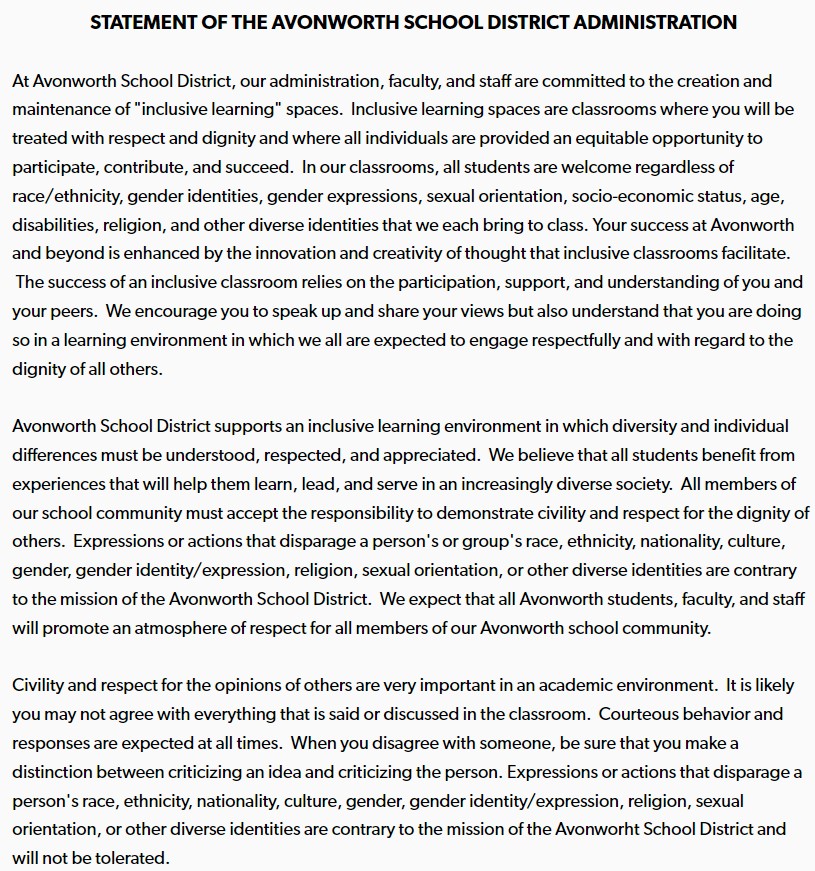
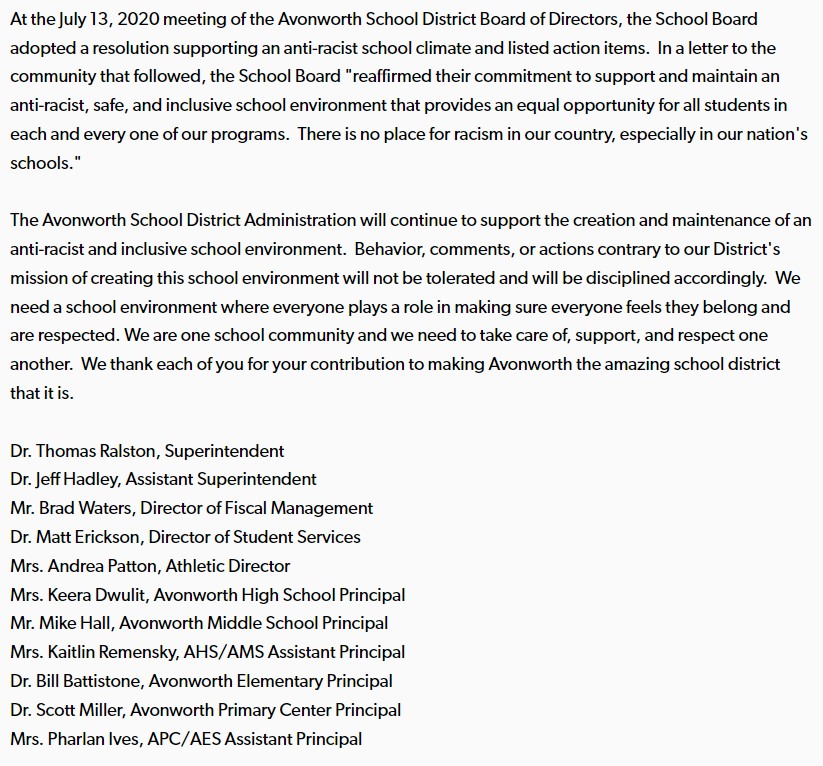
The school district’s “Strategic Plan 2020-2025” additionally emphasizes “Diversity, Equity, and Inclusion” with that being one of the five key areas. The strategic plan states that a goal is to “create and maintain a culturally responsive curriculum.” Part of this includes to “conduct a K-12 literary canon review for cultural responsiveness.” The strategic plan states that the school district will “review curricula” to address “cultural sensitivity,” “literary canon,” “social justice,” “multiple perspectives,” and “representation.”
Providing teachers with training is part of the strategic plan’s goal to implement equity district wide. The school district will provide “professional learning for cultural sensitivity, social justice, and equity in teaching” and will “introduce a new teacher induction session focused on unconscious bias.” The strategic plan also states that the school will “create a Social Justice Club,” “conduct an equity audit and act on recommendations,” and “implement No Place for Hate program at Middle and High School.”
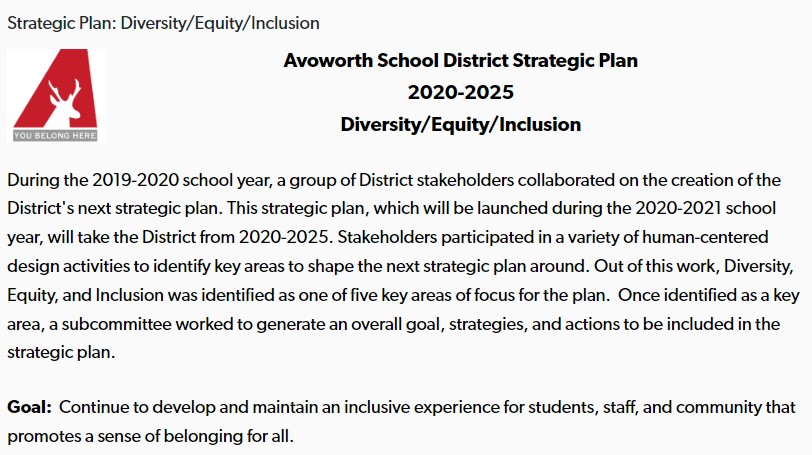
The school district’s website has a page titled “Culture 360 Survey and Equity Audit.” The page features an equity audit that the school district commissioned. The publishing date for this equity audit is March 2022. The audit was performed by the organization “Insight Education Group.” The audit states that “the equity audit team has developed this report in alignment with our Racial Equity Framework.” The organization conducted the equity audit between July 2021 and February 2022.
The equity audit covered “five domains” that included “structures, systems, and resources,” “culture and community,” “equity in the educator workforce,” “professional learning and personal growth,” and “curriculum, instruction, and learning.” As part of this equity audit, the school district had “school leaders, school district staff, middle and high school students, and family and caregivers” complete an equity survey of 25 to 40 questions. A total of 505 people were surveyed. The equity audit appears to admit that parents are resistant to the implementation of equity and explains that “there is evidence of some community resistance toward initiating changes to district policy and practices grounded in equity.”
One recommendation by the equity audit is to “develop and implement a plan for district-wide, consistently implemented professional learning, with a focus on cultural competence, for all levels of staff; including district office staff members.” This includes to “ensure that all aspects of equity and cultural competence, including race, ethnicity, LGBTQ+, and other identities, are addressed during professional learning.”
The equity audit states that a middle school teacher in the district “conducts student book clubs that highlight varied perspectives, with topics including race, gender, and physical and mental health.” The equity audit also states that “in the Modern Dilemmas; Race, Class and Gender; and World Cultures classes, issues of race, class, and gender are studied and discussed, and there is movement toward being more inclusive of the histories being taught.” The equity audit additionally states that “an advanced high school ELA class includes a unit of study focused on social justice/injustice and includes themes of intersectionality in readings and discussion.”
The school district’s website has a page titled “DEI Resources.” Resources on this page are labeled “Talking to Children About Difficult Topics,” “Books on Racism by Age,” and “Anti-Racism Resource Directory for Families.” The “Books on Racism by Age” resource features books for children that include Not My Idea: A Book About Whiteness, Woke: A Young Poet’s Call to Justice, and Stamped: Racism, Antiracism, and You.
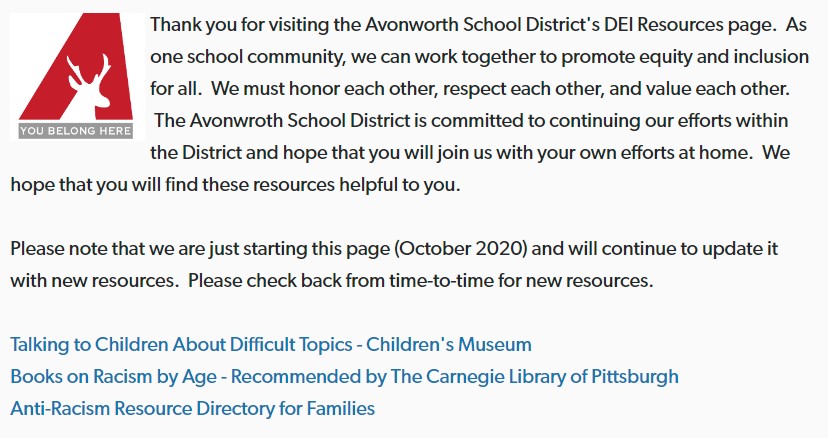
The school district appears to have a “Diversity, Equity, and Inclusion” newsletter with the most recent update in February 2021. The purpose of the newsletter is to provide updates on the district’s equity initiatives.

On the school district’s “Family Support and Resources” page, the ADL is promoted again. The school district provides resources for parents and teachers from the ADL titled “Discussing Hate and Violence with Children,” “Gun Violence and Mass Shootings,” “Empowering Young People in the Aftermath of Hate,” and “Helping Students Make Sense of News Stories About Bias and Injustice.”
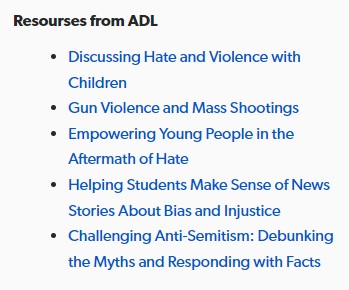
The school district’s website promotes three partners that are “Digital Promise,” “Future Ready Schools,” and “Remake Learning.” Digital Promise is an organization focused on education that frequently promotes “racial equity” and “racial bias.” The organization offers a certification in “Prioritizing Racial Equity in AI Design” because “efforts to mitigate racial bias are intentional throughout the design.” Digital Promise also has an article posted on the website titled “What Do Edtech and AI Have to Do with Racial Bias?” The article states: “In education, as well as many other societal institutions, there is already a long history of systemic racism embedded into many of the practices we consider standard in schools today.”


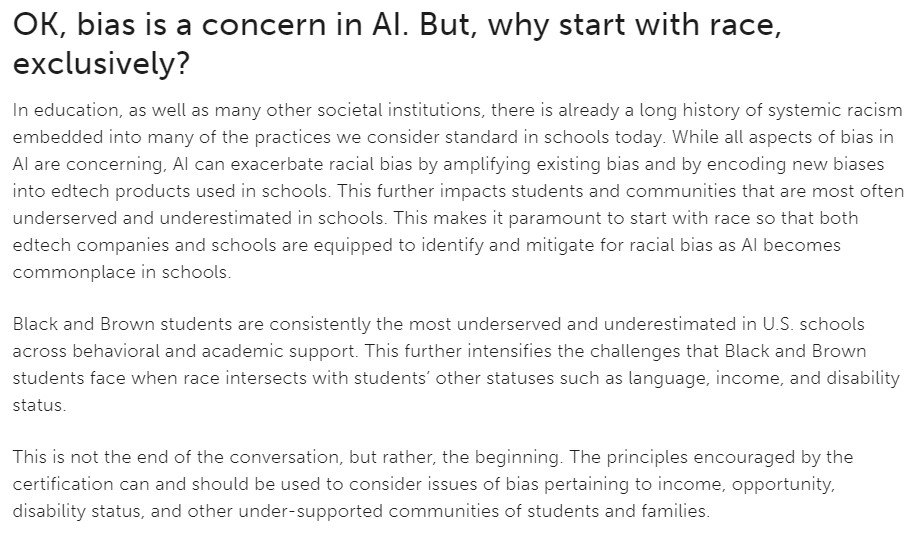
Future Ready Schools has a blog on the organization’s website titled “Pioneering Equitable Education.” The organization published the blog on May 31, 2022. In the blog, Future Ready Schools appears to support the idea of “culturally responsive teaching.” The organization also appears to support the push of “anti-racist efforts” in the blog.
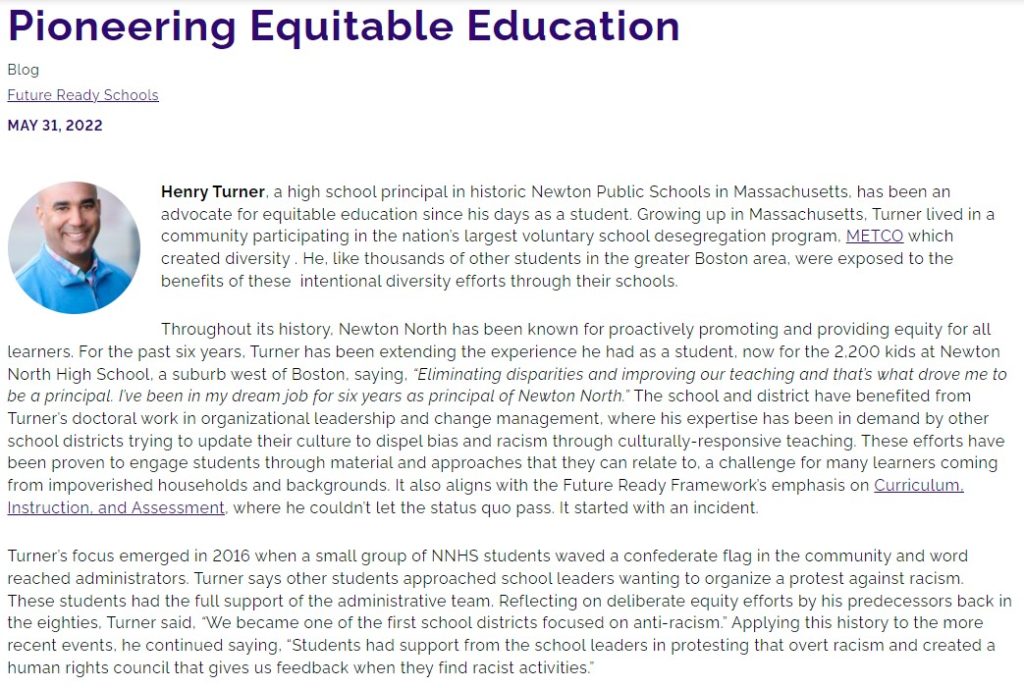
Remake Learning is an educational organization that also appears to focus on equity. On May 26, 2021, the organization held a webinar titled “Inside-out work: Embedding racial equity in organizational culture.” In the description for the event, Remake Learning states that “people can’t dismantle racism without talking about race, which can be uncomfortable” and that “truly embedding racial equity requires changing organizational practices and policies.” The organization also has articles on its website titled “Exploring Equity in Education” and “Leveling the Field: Equity across the Remake Learning Network.”
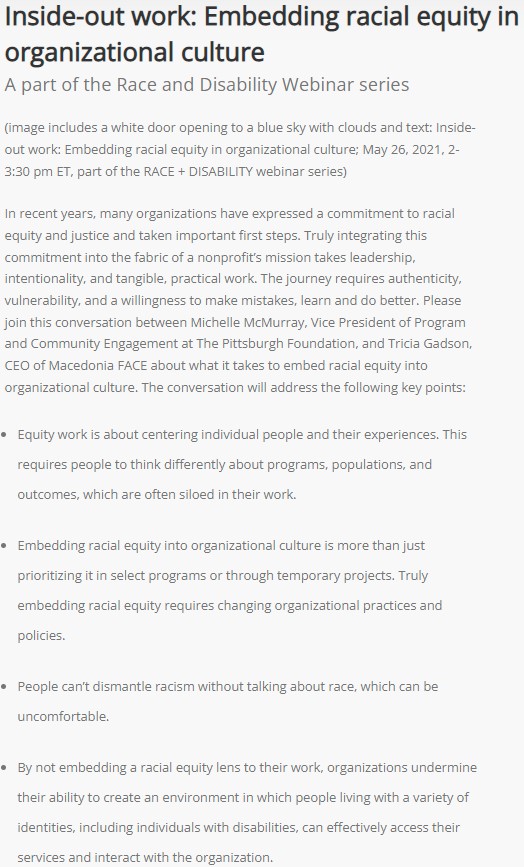
Remake Learning explains that the founder of the organization is Gregg Behr. The organization also explains that Yu-Ling Cheng-Behr is the “co-producer of Remake Learning Days Across America.” She is Gregg Behr’s wife and is also a member of the district’s School Board. Avonworth School District hosted two events that were part of the “Remake Learning Days Across America” program on May 12, 2022, and May 20, 2022.
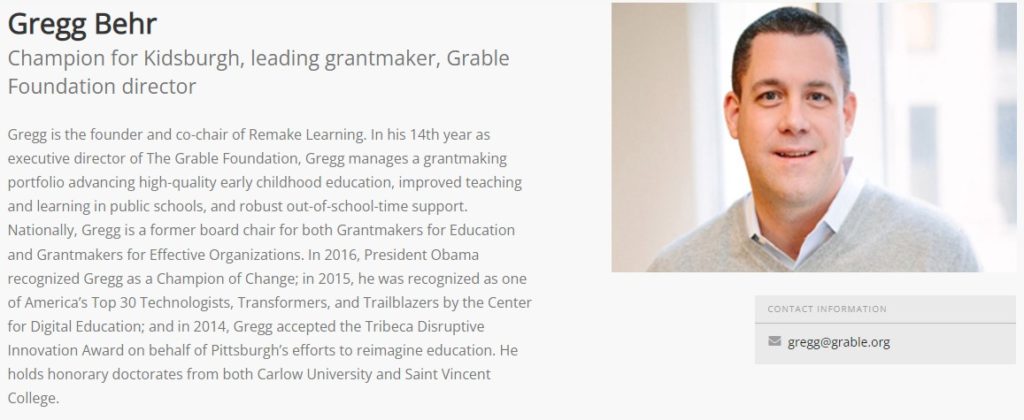
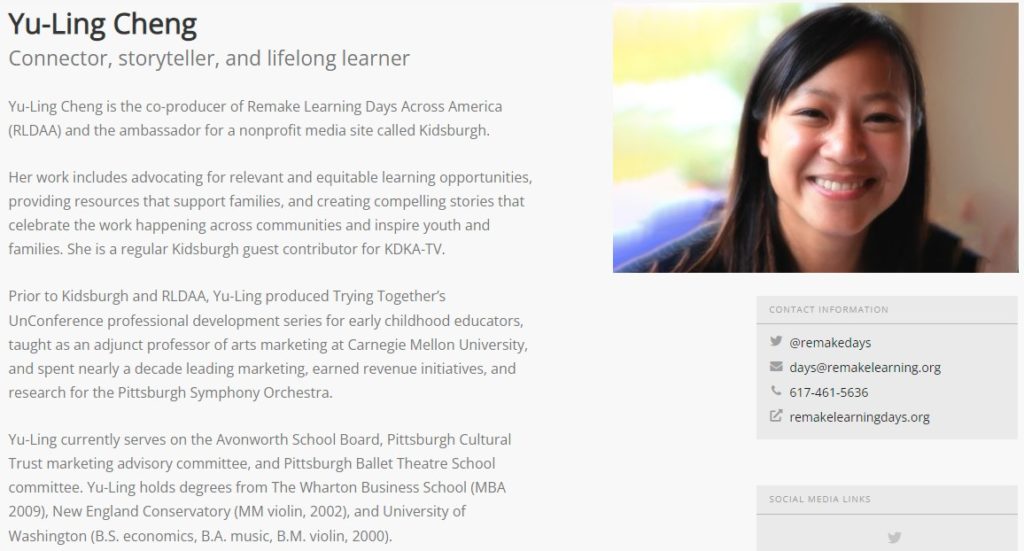
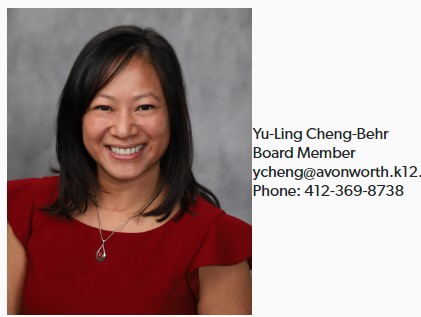
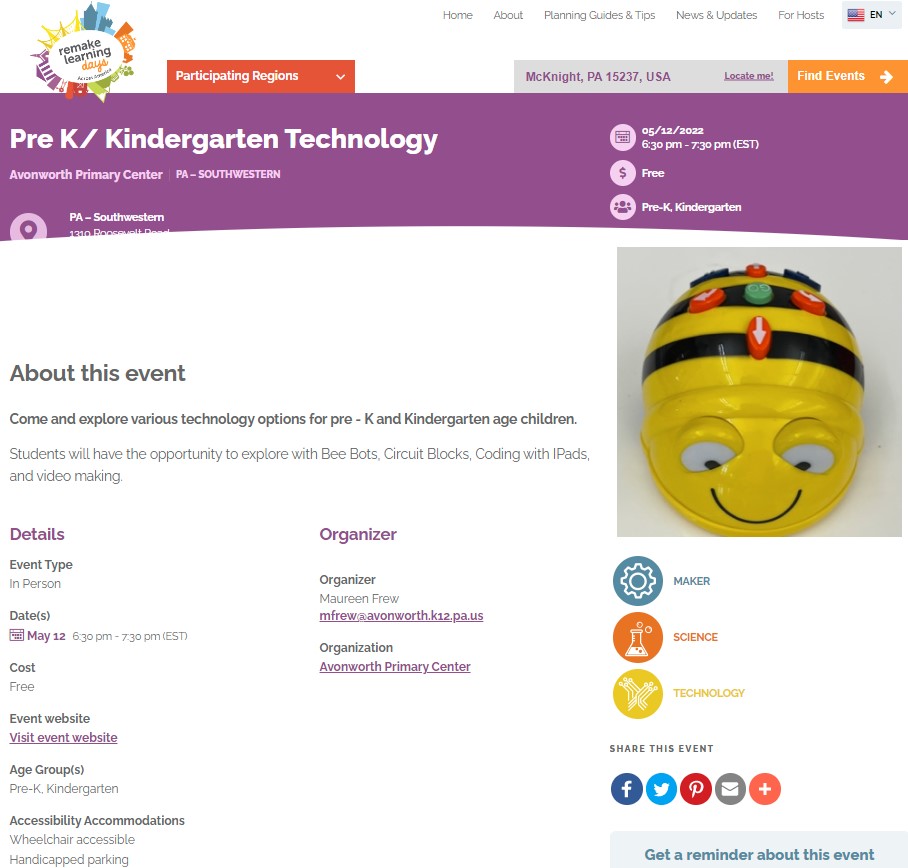
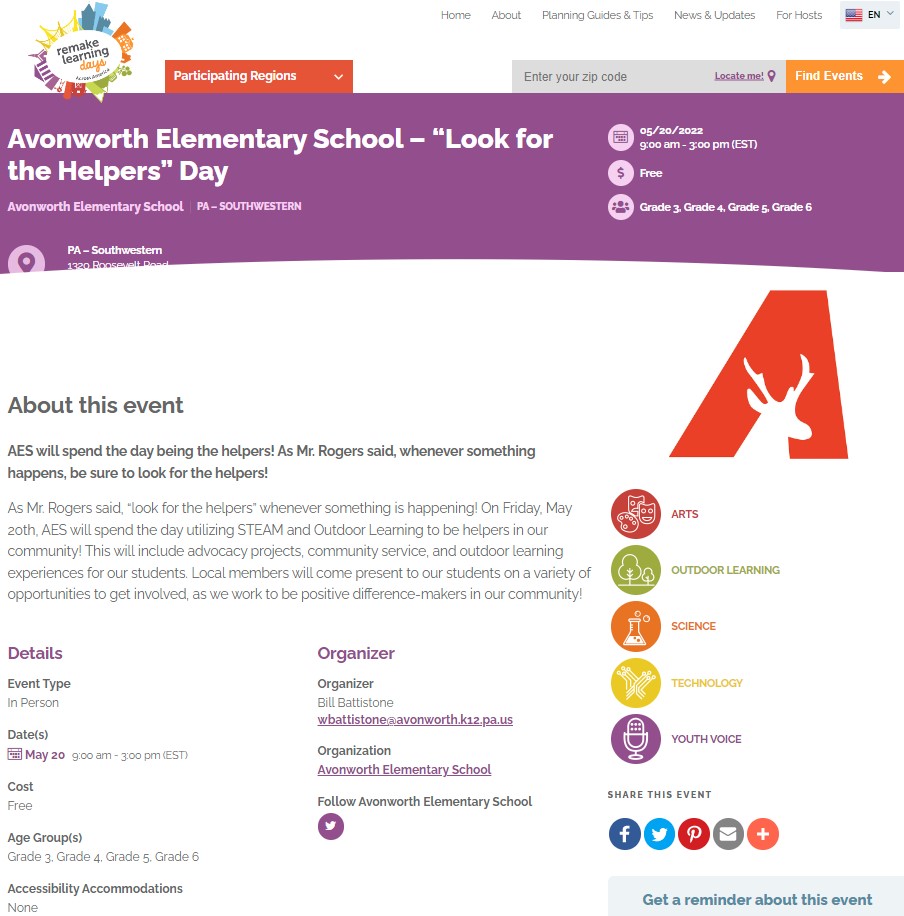
Stay Informed
